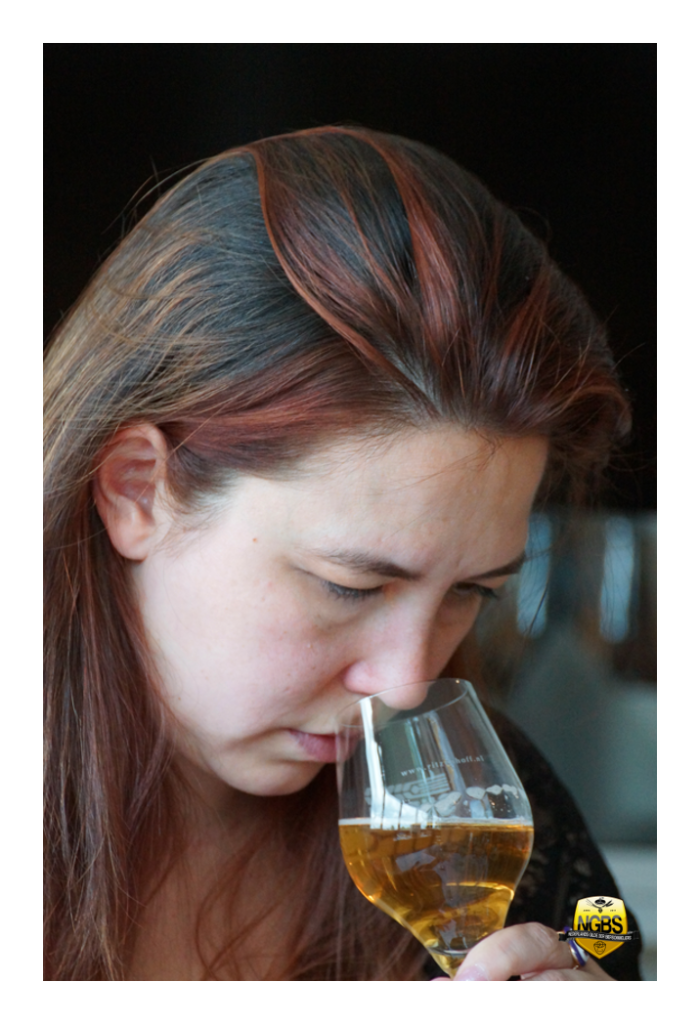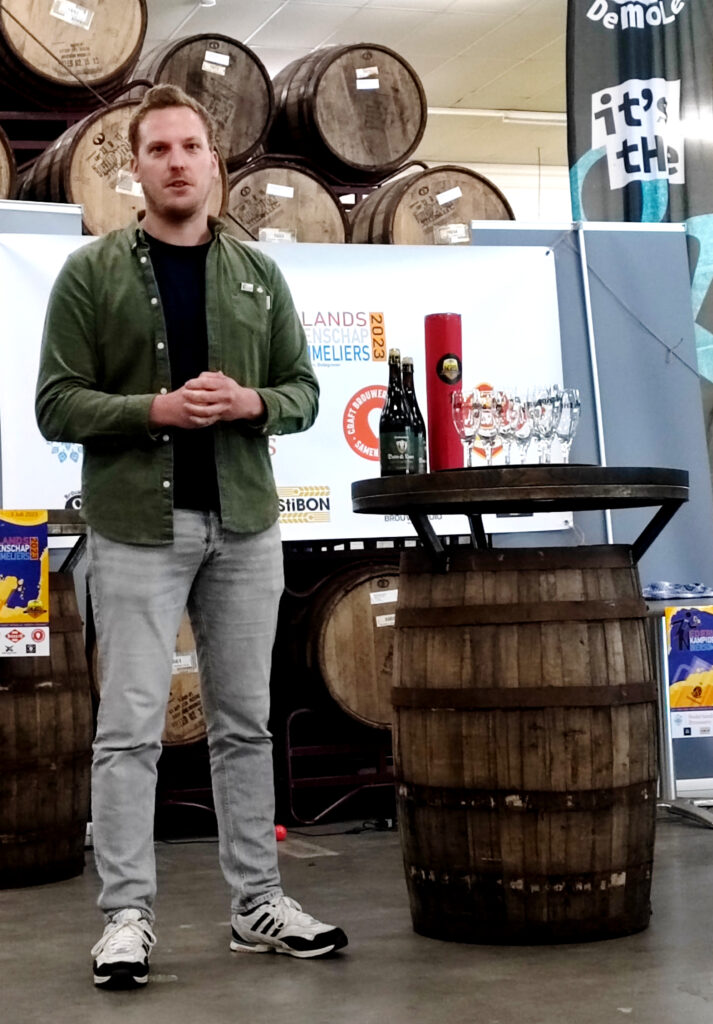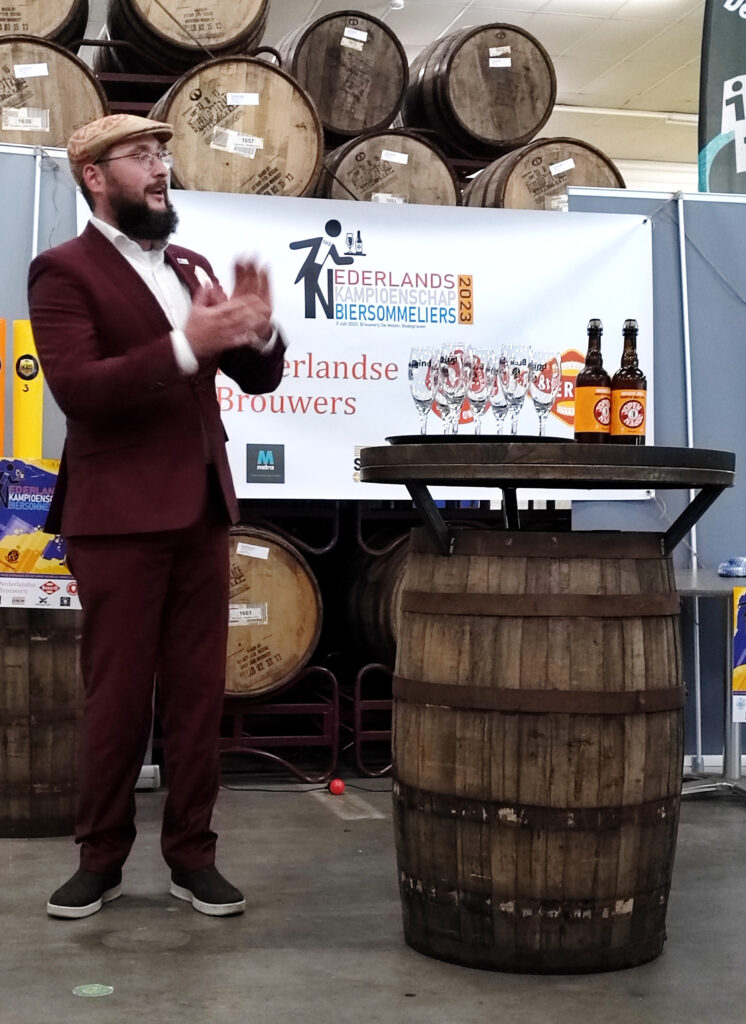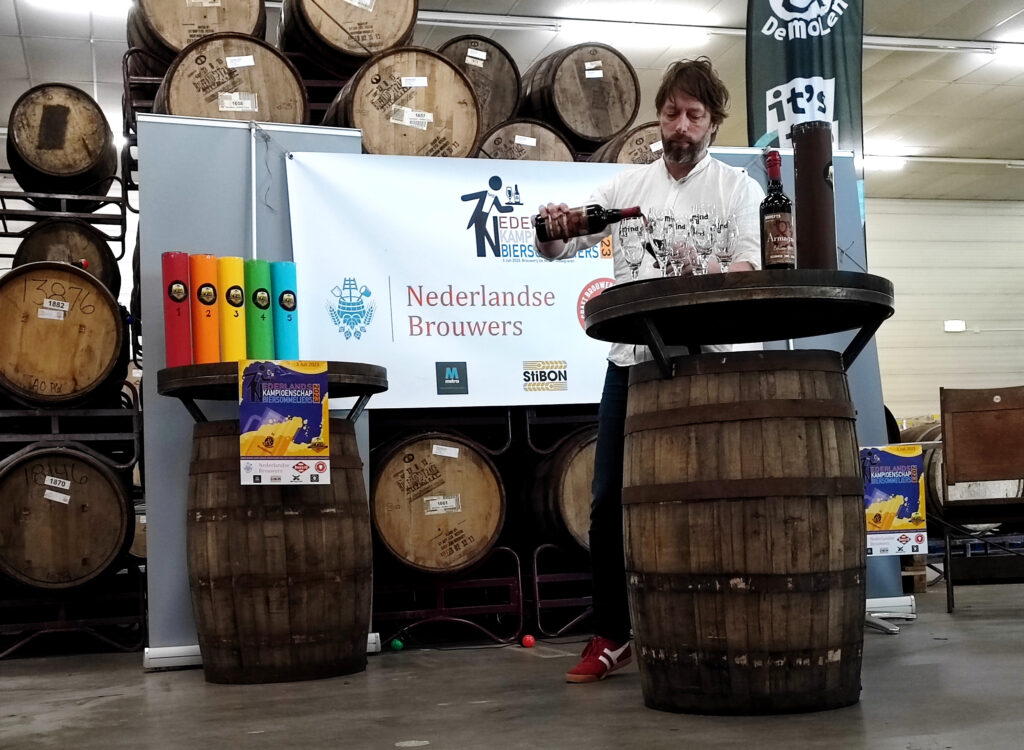Monday morning, the fourth of July. Nineteen beer sommeliers are ready to compete against each other at Brouwerij De Molen in Bodegraven in the third Dutch Championship of Beer Sommeliers.



It is still early in the morning when we gather in the Barrel Room of Brouwerij De Molen. We can get coffee and tea, but most participants opt for water. After all, in two of the three preliminary rounds we have to blindly recognize ten beer types and ten flavours and that is a lot more difficult with a lingering aftertaste of coffee still in the mouth. So, despite the lack of the caffeine kick, we settle with the more neutral taste of water while we wait for the instruction and the official start of the Dutch Cup of Biersommeliers 2023.

In June 2018, the Guild of Dutch Beer Sommeliers organized the first edition of the Dutch Championship of Beer Sommeliers. The match was then won by Pepijn van der Waa, closely followed by Dennis Kort and Hubert Hecker. They were therefore the team that represented the Netherlands at the World Cup in Rimini in 2019.
The second Dutch Championship was held in July 2022 at Brouwerij Duits & Lauret, two years later than planned and only two months before the next World Cup. Hubert Hecker managed to snatch the title of Dutch Champion this time, and together with Dennis Kort, Bas Schampers, Léon Rodenburg and Yoran Zonneveld represented the Netherlands at the World Championship in Munich. An absolute top team, as it turned out. They all managed to get high scores in the preliminary rounds and for the first time in history the Netherlands were represented in the finale! And not even just one, no, two Dutchies made it up to that stage: Hubert Hecker and Léon Rodenburg. And if that wasn’t enough, Léon also brought the bronze medal back home to the Netherlands!
Of course that whole team is also present at this Dutch Cup. Not only for the title of Dutch Champion, but also for the chance to compete again in the 2025 World Cup. Or, well, almost the entire team. As the current Dutch Champion, Hubert is not a participant this year, but one of the jury members for the finale. Not that this makes it easier or less exciting for the other participants in the competition. It is clear that the level in the Netherlands is high and the competition is fierce.

Nevertheless, the atmosphere this morning is mainly jovial and friendly. With glasses of water in hand, new friends are made and old friendships rekindled, although in some cases it has been less than a week since we last saw each other. Of course everyone is here to win that coveted title, but the championship is also a moment together with fellow beer sommeliers and most of all an opportunity to test your own knowledge and skills and where you can improve for next time.
But that it is also a competition becomes clear again when Uwe Kalms enters on behalf of the guild and the tension rises noticeably. A short explanation, one last wee, and the battle is on!
The first part takes place behind closed doors. One after the other, we are given a blind taste of ten beer types, fifty theory questions about all possible topics in the broad field of beer sommelier and we conclude with a blind tasting of ten flavours.
For both test rounds we can choose from a list of thirty options. The types include, for example, German Pilsner, Bohemian Pilsner, Belgian Blond, Strong Blond, various IPA types, Best Bitter, Strong Bitter and California Common, but also Dubbel, Belgian Barleywine, English Barleywine and Old Ale. Flavours include (in unofficial terms) butter, cloves, baby vomit, boiled eggs, drain, allspice, blood, grain, hop oil extract, and stale potatoes. Previously, there was also talk of off flavours or taste deviations, but the substances are just as often desired or intended as such in the beer, so the more general flavours is more fitting.
The theory questions can be about anything and everything in the broad theme of beer. Of course there are questions about beer types, beer and food combinations and taste, but there are also questions about legislation, history, health, the biochemical properties of beer ingredients and the effect on beer of specific steps and actions during brewing and beer treatment.




So three hours of hard work, and then it is done. There is no more you can do and you just have to wait for the results. It is just after noon when we all have lunch together. We can now do nothing but wait for the points to be counted, after which we will hear which six candidates can proceed to the final. In contrast to the World Cup, we unfortunately do not get to see our scores at the Dutch Cup. That is a pity, because it is precisely this transparent communication during the world championship, where the scores are announced anonymously with the help of your participation number before the finale, that has prevented a situation before.
Halfway through lunch we do get to see which beer types and flavours we had to guess in the preliminaries, so you can already make an estimate for yourself of how you scored in the those rounds and what your chances for a place in the finale are. It is also the time for the jury to arrive one by one. This year the jury consists of Lydian Zoetman from Jopen, Carina Kelder from Mommeriete, Iris van Asten from De Molen, Ron Stoop from Hopster Magazine, Hubert Hecker as current Dutch Champion and Arvid Bergström as chairman of the guild.



Slowly but surely the last sandwiches are finished off and the room is prepared for the finale. And then the moment is there. Uwe and Arvid walk forward and without further ado announce the finalists. Not entirely unexpected of course, we hear the names Dennis Kort, Léon Rodenburg, Bas Schampers and Yoran Zonneveld. Martin Ter Harkel, who almost made it to the finale last year, is the fifth to come forward. The sixth name to be announced comes as a surprise, not in the least to that finalist himself! Tom Stellingwerf, who is participating for the first time this year, also has a shot at the national title!
The order in which the finalists will have to give their presentation is decided randomly. Their place also determines which for now still unknown beer they will have to present. They will only know which beer it is when they are on stage and only get three minutes on the spot to prepare a presentation about that beer. They then have ten minutes to present the beer to the jury and the audience. They also have to serve the beer to the jury. The finalists are judged on the organoleptic description of the beer (i.e. the description of the taste, aroma and mouthfeel), their relevant knowledge related to the beer, such as information about the beer type and/or brewery, the techniques used serving the beer, describing a suitable beer and food pairing and of course their presentation skills overall.



This way of assigning a beer is in line with last year’s world cup, but in previous years at both the national championship and the world championship, the finalists were allowed to choose from three beers. That is not the case this year, you are now assigned one beer and you only see which beer that is at the moment of presentation itself.
There is something to say for both methods. The field of beer sommelier in itself is already broad, and I mean really, really broad (see the theoretical questions), so a lot of people specialise because it is next to impossible to know much about everything. In addition, the number of breweries, let alone the number of beers, that exist all over the world is out of this world! The Netherlands alone have 941 breweries and it is impossible to know the same amount about every beer and every brewery. It can therefore be quite frustrating if you get a beer from a brewery that you know absolutely nothing about, while someone else gets a beer from a brewery that they visit every week. Although you can take advantage of this by zooming in on the beer and the beer type itself. You could also get a beer from one of the judges, which can be scary and can be both an advantage as a disadvantage. You KNOW that judge knows more about that beer and the brewery than you can ever know, but if you can really sell that beer you might get bonus points from that judge. Either way, all situations that can add a lot of tension to an already nerve-wrecking situation of actually being in a finale and having to present a beer, not to mention making up that presentation on the spot. So I think it would be nice to at least have some control over that tension by being able to choose which situation you will tackle by the still limited choice of three beers.
On the other hand, hey, it is about the national title, and if you want to call yourself the best Beer Sommelier of the Netherlands, then you also have to know something about everything or at least be able to tell a selling story about every beer on the spot!

But back to cup. The finalists get fifteen minutes to change, after which Léon comes out first. With his clear presentation about Bière de Garde Brune from Duits & Lauret, he immediately sets the bar high. He is followed by Yoran, who struggles a bit at first with the Meermoid by Brouwerij De Werf, a beer unknown to him, but manages to come back with his humor and wit and got a lot of laughs. After Yoran we get to enjoy a very enthusiastic Dennis with Mooie Nel from Jopen. Visibly at ease, he knows how to sell the Mooie Nel well. The fourth finalist is semi-newcomer Martin with Lactic Fantastic from De Kromme Haring. Last year he was really nervous about the idea of having to present in the finale, which was a real possibility at one point that day, so this year he was a little more prepared. Still a bit jittery, but significantly less than last year, he entertains us with a nice story about this beer, even though he did not know the beer beforehand either. Bas, the fifth candidate, is clearly way more familiar with his beer La Trappe Isid’or from Abbey Onze Lieve Vrouw van Koningshoeven and delights us with a beautiful and substantive story about the beer and the brewery. Tom Stellingwerf concludes the finale with his presentation about the Rex & Raptor Armagnac barrel aged Eisbock from Brouwerij de Molen, especially brewed for Borefts 2022. However, he indicates that he is so overcome by the fact he even made it to the finale, that the tension has become just too much for him, so he stops his presentation early. Yet he too can be proud of what he already has achieved! And of course, like the rest, he can try again next year, knowing now that he does have a real chance of a place in the finale and therefore may have to present again. With that, the finale is over for the finalists and the jury retires for deliberation. For some of the finalists you can see the tension really rising now, while for others the relief is clearly visible. At least the nerve-wrecking presentation is now over and done, nothinh to do about that, they now just have to wait. And whatever the results, they did it, they were there, on that stage! I certainly enjoyed it.






Fortunately, the jury does not leave us in suspense for long.
And so the new Dutch Champion is…
Dennis Kort!
In my opinion it could not have been any other way. After being placed second two times in a row in the Dutch championships, top performances in both world championships, and not to forget the really high scores in the preliminary rounds of this cup, all topped of with his very enthusiastic presentation of the Mooie Nel, a justified winner! On top of the title, he also has secured a spot for the Worlc Cup in 2025, together with Bas Schampers, who came in second this time. They might be joined by Léon Rodenburg, who became third, but that will become more clear after the Dutch Cup in 2024. The rest of the World Cup squad will be determined by the Dutch Championship in 2024, and I know that will be a very intense one!
Will I see you there in 2024?

